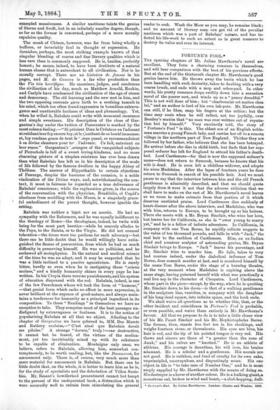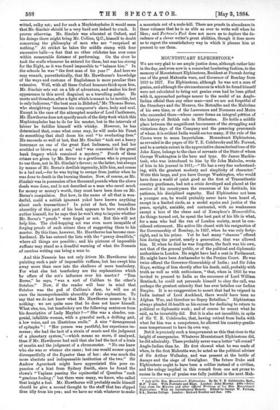FORTUNE'S FOOL.* Tax opening chapters of Mr. Julian Hawthorne's novel
are excellent. They form a charming romance in themselves, and will bear comparison with the best of his previous efforts. But at the end of the thirteenth chapter Mr. Hawthorne's good
genius leaves him. He throws away the burin which he has been handling with such dexterity, takes to daubing with a very coarse brush, and ends with a mop and ochre-pail. In other words, his pretty romance drops swiftly down into a sensation novel of the poorer sort, and winds up as a" penny dreadful." This is not well done of him ; but " charbonnier eat maitre chez lui," and an author is lord of his own ink-pots. Mr. Hawthorne can still, if he likes, snap his fingers at the critics ; but the time may conic when he will reflect, not too joyfully, over Bentley's maxim that "-no man was ever written out of reputa- tion but by himself." Very succinctly told, the story of "Fortune's Fool " is this. The eldest son of an English noble- man marries a young-French lady, and carries her off to a remote village in the northern part of New England. Thither they are followed by her father, who believes that she has been betrayed. He arrives before she dies in child-birth, but finds that her sup- posed seducer has left for England to attend his father's death- bed. Lord Castlemere—for that is now the supposed seducer's name—does not return to Suncook, because he knows that his wife is dead. He is soon left a childless widower, and adopts his niece Madeleine. After the lapse of fourteen years he does return to Suncook in search of his possible heir. And we must pause to say that the interview between him and the old French gentleman is admirably described, and that we should quote largely from it were it not that the adverse criticism that we shall have to make on the rest of Mr. Hawthorne's novel leaves us no room to make extracts from that portion of it which deserves unstinted praise. Lord Castlemere dies suddenly of heart-disease after the above interview, and Madeleine, who was with him, returns to Europe, to be brought up as his heiress. There she meets with a Mr. Bryan Sinclair, who wins her love, but leaves her for California, as she is " ower young to marry yet," and he is a fellow of infinite adventure. In California, in company with one Tom Berne, be rapidly collects nuggets to the value of ten thousand pounds, and falls in with "Jack," the real heir to the earldom of Castlemere. Him, an ex-Indian chief and amateur sculptor of astounding genius, Mr. Bryan- Sinclair brings to Europe. " Jack " learns his parentage, and Mr. Sinclair tries to murder him. He fails, takes to very bad courses indeed, under the diabolical influence of Tom Berne, does commit murder at last, and is murdered himself by the same Torn Berne, under the stage of a burning theatre, at the very moment when Madeleine is expiring above the same stage, having poisoned herself with what was practically a real live asp in the character of Cleopatra. Lord Castlemere, whose part in the piece—except, by the way, when he is quoiting Mr. Sinclair down to his doom—is that of a walking gentleman in the sculpture line, vanishes, in company with the daughter of his long-dead squaw, into infinite space, and the book ends.
We shall waive all questions as to whether this, that, or the
other incident and coincidence in Fortune's Fool is probable, or even possible, and waive them entirely in Mr. Hawthorne's favour. All that we propose to do is to take a little closer view of his Mr. Faust Sinclair and his Mr. Mephistopheles Berne. The former, then, stands five feet ten in his stockings, and weighs fourteen stone, or thereabouts. His eyes are blue, his hair is red, and the tip of his pointed tongue is very red. His thews and sinews are those of "a greater than the eons of Anak," and his calves are "knotted." He is an athlete of athletes. His courage is dauntless, his will iron, his brains adamant. He is a scholar and a gentleman. His morals are not good. He is ruthless, and fond of cruelty for its own sake, unprincipled, unscrupulous, and disgustingly mean. His one object in life is "to take care of N umber One," and he is most amply supplied by Mr. Hawthorne with the means of doing es. His destroyer is a horse of another colour. He is a hulking gianka monstrous oaf, broken in wind and heart,—a clod-hopping, dull-
• Fortunes 'bd. By Julian Hawthorne. London ; Matto and Hindus. 1888.
witted, sulky sot; and for such a Mephistopheles it would seem that Mr. Sinclair should be a very hard nut indeed to crack. It proves otherwise. Mr. Sinclair was educated at Oxford, and his doings there might bring Mr. Collins, Q.C., himself to doubt concerning the philosophy of men who are "surprised at nothing." At cricket he takes the middle stamp with four successive- balls—a feat that no other cricketer has ever come within measurable distance of performing. On the river he took the sculls whenever he entered for them, but was too strong for the Eight, as it was found impossible to "balance him." In the schools he was "the first man of his year !" And here we may remark, parenthetically, that Mr. Hawthorne's knowledge of the ways and customs of Englishmen is more peculiar than extensive. Well, with all these Oxford honours thick upon him, Mr. Sinclair sets out on a life of adventure, and makes his first appearance in this novel disguised as a travelling pedlar. He meets and thrashes, after a fight Which is meant to be terrible, but is only ludicrous," the best man in Bideford," Mr. Thomas Berne, who straightway becomes his conqueror's slave, body and soul. Except in the case of the attempted murder of Lord Castlemere, Mr. Hawthorne does not specify much of the dirty*ork which this Mephistopheles has to do for his master, but in the intervals of labour he fuddles himself with whisky. However, he has determined that, come what come may, he will make his Faust do something that shall doom his soul "to everlasting fires." He succeeds so well at last, that Mr. Sinclair "took out a heavy insurance on one of the great East Indiameu, and had her scuttled or blown up at sea," and "was concerned in the great bank forgery which remained a mystery." Proofs of these -crimes are given by Mr. Berne to a gentleman who is prepared to use them, not in Mr. Sinclair's favour; so the latter, but always by means of Mr. Berne's devilish ingenuity, kills him, and comes to a bad end,—for he was trying. to escape from justice when he was done to death in the burning theatre. Now, of course, as Mr. -Sinclair was in possession of ten thousand pounds when the above deeds were done, and is not described as a man who cared much for money or money's worth, they must have been done on Mr. Berne's compulsion. But how, in the name of all that is won- derful, could a sottish ignorant yokel have known anything about such transactions ? In point of fact, the boundless absurdity of this part of his book appears to have struck the author himself, for he says that he won't stop to inquire whether Mr. Berne's " proofs " were forged or not. But this will not help him. The clod-hopping sot was even more incapable of forging proofs of such crimes than of suggesting them to his master. By this time, however, Mr. Hawthorne has become case- hardened. He has entered the lists with the "penny dreadfuls," where all things are possible ; and his pictures of impossible ruffians may stand as a dreadful warning of what the Nemesis -of careless writing can bring a man to.
And this Nemesis has not only driven Mr. Hawthorne into painting such a pair of impossible ruffians, but has swept him away more than once into the shallows of mere tomfoolery. For what else but tomfoolery are the explanations which ire offers of the sot's influence over his master P "Tom Berne," he says, "was a sort of Caliban to the other's • Setebos." Now, if the reader will bear in mind that 1Setebos was the god of Caliban's dam, he will see at -once the incomprehensible absurdity of this explanation. To say that we do not know what Mr. Hawthorne means by it is nothing: we are quite sure that he does not know himself. What else, too, but tomfoolery are the following sentences from his description of Lady Mayfair ?—" She was a slender, con- genial, infallible woman, with a graceful neck, a drifting gait, a low voice, and an illustrious smile." A nice "derangement of epitaphs " ! "Her person was youthful, her experience im- mense; she had the tact of a strain of music and the judgment of a planetary system,"—which means no more, if analysed, than if Mr. Hawthorne had said that she had the tact of a train of muslin and the judgment of a chronometer. "No one knew -who she was or whence she came; but one would sooner speak -disrespectfully of the Equator than of her : she was much the more absolute and indispensable institution of the two." Sir Andrew Agnecheek might have appreciated this poor ex- pansion of a hint from Sydney Smith, since he found the clown's " Vapians passing the equinoctial of Quenbus "such "gracious fooling ;" but there were many, we know, who called -that knight a fooL Mr. Hawthorne will probably smile himself should he give a second thought to the stuff that has slipped thus idly from his pen ; and we have no wish whatever to make
a mountain out of a mole-hill. There are proofs in abundance in these volumes that he is as able as ever to write well when he likes; and Fortune's Fool does not move us to deplore the de- cadence of a clever writer's great abilities, though it does move us to regret the unsatisfactory way in which it pleases him at present to use them.



































 Previous page
Previous page